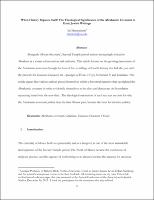Please use this identifier to cite or link to this item:
https://hdl.handle.net/20.500.12202/4570| Title: | When History Repeats Itself: The Theological Significance of the Abrahamic Covenant in Early Jewish Writings. |
| Authors: | Mermelstein, Ari 0000-0002-3572-9518 |
| Keywords: | Abraham covenant Galatians Damascus Document 1 Enoch |
| Issue Date: | 2017 |
| Publisher: | SAGE Publications |
| Citation: | Mermelstein, Ari. (2017). When History Repeats Itself: The Theological Significance of the Abrahamic Covenant in Early Jewish Writings. Journal for the Study of the Pseudepigrapha 27(2), 113-142. |
| Series/Report no.: | Journal for the Study of the Pseudepigrapha;27(2) |
| Abstract: | Alongside ‘Mosaic discourse’, Second Temple period authors increasingly looked to Abraham as a source of instruction and authority. This article focuses on the growing importance of the Abrahamic covenant through the lens of five re-tellings of Israel’s history that link the past with the present: the Damascus Document, the Apocalypse of Weeks, 4 Ezra, Nehemiah 9, and Galatians. This article argues that various authors placed themselves within a historical narrative that spotlighted the Abrahamic covenant in order to identify themselves as the elect and demarcate the boundaries separating them from the non-elect. The ideological orientation of each text can account for why the Abrahamic covenant, rather than the later Mosaic pact, became the basis for identity politics. |
| Description: | Scholarly journal article |
| URI: | http://doi.org/10.1177/0309089217746847 https://hdl.handle.net/20.500.12202/4570 |
| ISSN: | 0951-8207 |
| Appears in Collections: | Yeshiva College: Faculty Publications |
Files in This Item:
| File | Description | Size | Format | |
|---|---|---|---|---|
| Mermelstein When_History_Repeats_Itself_2017 JSP 113-142.pdf | post-print PDF author | 907.06 kB | Adobe PDF |  View/Open |
This item is licensed under a Creative Commons License

